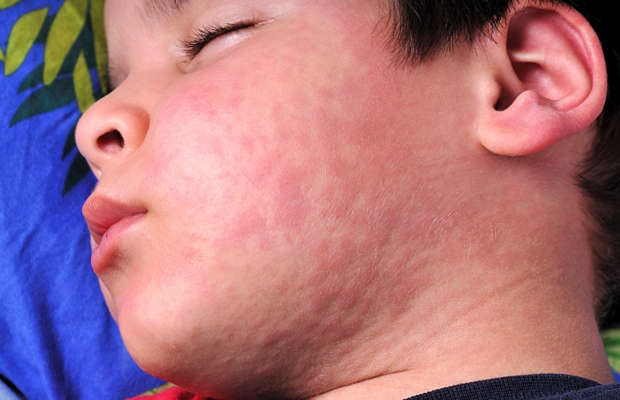
Sexually transmitted diseases are on the rise, yet most are preventable with the simple use of a condom. According to the Centers for Disease Control and Prevention, gonorrhea reached almost 400,000 cases in 2015 and is being transmitted to more people at a faster rate, as are other STDs like chlamydia and syphilis. Young gay and bisexual men are most affected by the increasing STD rates.
“The STD epidemic is getting worse in the United States and, in fact, is at its highest levels yet,” Dr. Jonathan Mermin, director of CDC's National Center for HIV/AIDS, Viral Hepatitis, STD, and TB Prevention, told NBC. The good news is that gonorrhea is curable with antibiotics — as are chlamydia and syphilis — but simply using protection in the bedroom can stop this disease in its tracks.
Measles
This disease was all but eradicated in developed countries thanks to a vaccine, but it has begun to make a comeback in recent years, in part because people have not been getting vaccinated. The National Institutes of Health note that measles is not treatable and is highly infectious, causing a high fever, cough, runny nose and irritated eyes, as well as a rash. It is most deadly to children.
Although global measles infection rates have been dropping overall in recent years, developed countries have shown “a worrisome harbinger — measles outbreaks are occurring where they are least expected,” according to an NIH article. It attributes the bumps to both people who refuse vaccinations as well as failed vaccinations. Of those two problems, the former can be solved: “Failure to vaccinate is a serious socio-cultural issue, and significantly hampers public health goals,” the article says. “Measles immunization rates, particularly in certain areas of the U.S. and western Europe, have plateaued or decreased and experts suspect this is a result of the now-debunked notion that measles vaccine caused autism — a false claim that adversely influenced ... vaccination choices among a generation of parents.”
In order for vaccines to be effective for all of society — protecting people like infants and the seriously ill who cannot receive a vaccine — and eliminate a disease, about 95 percent of people need to be vaccinated. If people will step up to the plate in 2017 and get vaccinated, we can stop measles from spreading.
Fetal alcohol syndrome
One of the things that makes fetal alcohol syndrome more difficult to eradicate is that women struggling with alcohol addiction may be less likely to know they are pregnant, as risky behaviors related to alcohol and sex can go hand in hand. But drinking while pregnant can cause birth defects like skull malformations, low body weight, neurological issues, decreased motor function, learning disabilities, attention and memory difficulties, behavioral deficits, vision and hearing problems, and language delays, among other issues. The greatest risk is for pregnant women who have more than four drinks at once or more than seven in a week.The NIH estimates that between 20 and 30 percent of women drink alcohol at some point during their pregnancy, perhaps because half of all pregnancies are unplanned. In the U.S., fetal alcohol syndrome affects about two in every 1,000 births.
We can prevent fetal alcohol syndrome by offering more help to alcoholics, using contraception to prevent unplanned pregnancies, and educating prospective parents about the dangers of drinking alcohol during pregnancy.
Obesity
The condition of obesity plays a role in diseases that affect just about every part of the body. The excess body fat “isn't just a cosmetic concern,” the Mayo Clinic notes. “It increases your risk of diseases and health problems, such as heart disease, diabetes and high blood pressure” and thus can be life-threatening.
The American Heart Association estimates that almost 17 percent of children and 35 percent of adults are obese. Despite the genetic or medical issues underlying some cases of obesity, however, it largely can be reduced or prevented through a healthier lifestyle: “Even modest weight loss can improve or prevent the health problems associated with obesity,” the Mayo Clinic says. “Dietary changes, increased physical activity and behavior changes can help you lose weight.”
There are other illnesses that we cannot completely eradicate, like the common cold and the flu, but taking simple steps such as covering our mouths when we cough or sneeze, washing our hands and getting a flu shot can greatly reduce the numbers of people who are infected. As a community, all of society should do their part and help snuff out preventable illnesses.
 14 Foods That Cause Inflammation and Are Making You Fat
14 Foods That Cause Inflammation and Are Making You Fat

source : Medical Daily (http://www.medicaldaily.com/)
Related keywords : cdc's national center for hiv/aids, immunization, fetal alcohol syndrome, new year's day, getty images, mayo clinic, national institute of health, tb, syphilis, disease, common cold, flu, certain diseases, contraception, std epidemic, jonathan mermin, measles, director, united states, autism, heart disease, pregnant can cause birth defects, diabetes, antibiotics, measles infection, cause inflammation, prevention, runny nose, western europe, this disease, american heart association, nbc, vaccinations, obesity, stds, vaccination, diseases, viral hepatitis, high blood pressure, cough, high fever, gonorrhea, rash, language delays, sexually transmitted diseases, centers for disease control and prevention

0 Comments